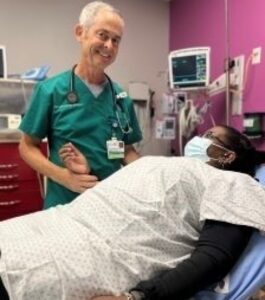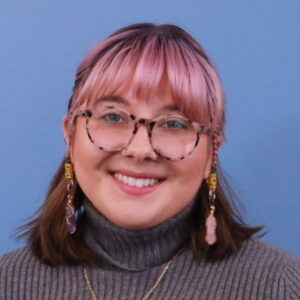
Leonardo Alonso, DO, was recognized as a locum hero by our judging panel of healthcare professionals for his work on locum tenens assignments, as well as his volunteer efforts both domestically and internationally. As a Barton Associates Locum Hero, Dr. Alonso will receive a personal award of $2,500 and a donation of $2,500 will be given in his name to a charity of his choosing. Continue reading to learn more about Dr. Alonso’s story, as well as the charity that he selected!
Meet Dr. Leonardo Alonso
Leo Alonso, DO, has been a locum tenens Emergency Medicine physician since 2015, but his history of domestic and international volunteer work spans far longer, having begun his philanthropic journey over 20 years ago.
Dr. Alonso got started in volunteer work fresh out of college when he joined the Peace Corps, originally beginning his international service with rural development work, helping to advance small communities overseas through teaching gardening, English, and more.
His work since then has advanced by leaps and bounds, especially after obtaining his medical education and degree. Over the years he has volunteered on various medical missions in such countries as Haiti, India, Guatemala, Cambodia, and Ecuador.
He is currently working with the Ministry of Education in Honduras, where he focuses most of his overseas volunteering, to open up an Emergency Medicine residency as a part of a UCLA project called Project SEMILLA, but his efforts don’t just stop there.
Back home, Dr. Alonso also works to improve his own community in Jacksonville, Florida, where every month for the past 18 years he has volunteered at a free clinic called Volunteers of Medicine, providing free primary and specialty care to those without private health insurance.
Between his overseas missions and domestic volunteering efforts, Dr. Alonso enjoys doing locums because they allow him to explore new and beautiful places across the U.S. while earning income, and also provide him with the flexible schedule he needs to plan around his volunteer work.
We were inspired to see how one person can give so much of themselves to make the world a better place, so we sat down with Dr. Alonso to learn more about what he does and why he does it.
We were impressed to read that you’ve been volunteering overseas for over 20 years, what motivates you to keep going back?
I think when you volunteer in healthcare, you give a lot of yourself, and it’s very rewarding. These are often poorer countries that don’t have the infrastructure and can’t provide the level of care that we can.
We’re all on this earth for a short time, and you hope that you can leave something behind of lasting value. There’s a saying in the Peace Corps that you teach a man how to fish and he’ll fish forever, but if you just give him a fishing pole, that only goes so far.
The key is to teach people and to have the legacy carry on for generations, and with our specialty in emergency medicine, I think it’s very impactful. What we do really does save lives and mitigates suffering on a very real basis, and I think that just knowing that what you do continues to help others, while it may be very altruistic, is still very rewarding. That’s what keeps me going.
Are there any challenges you face in your international work?
Sure, there are several challenges, and one of them is logistics. Just getting there or getting the equipment there. A good, organized team ships it ahead of time, but you also bring a lot of stuff with you.
The other challenge is of course language, which, in Latin America, is not a big issue for me. But when we went to, for example, Cambodia, you needed a team of translators.
Of course there’s always financial challenges. Sometimes when you get there you realize that they don’t have this drug or this medicine and they don’t have ultrasound or a CAT scan or whatever it is that you need. You have to work with the resource limitations of that country.
How do you feel that your work impacts the local patient populations and healthcare providers?
What I’m trying to do is bring my specialty, which doesn’t even exist there, into the Ministry of Health and Education so that it becomes a part of the curriculum and has a ripple effect.
For example, in emergency medicine, we work with what’s called the pre-hospital EMS; 911 and ambulances. They don’t even have that there, so once you establish your specialty, that becomes a sort of ripple effect. People expect a functional emergency department to have a functional pre-hospital, as we say, EMS system, and I think that will happen once we get our residency down there.
You also volunteer monthly here in the states, tell us a bit about your domestic work.
Unfortunately in the US, as much as we pride ourselves in a fairly good system, it’s also very dysfunctional. It doesn’t cover everybody.
So, I volunteer at a free clinic that a couple of people founded about 20 years ago called Volunteers of Medicine, and you just have to qualify by showing that you work and don’t have private insurance.
Myself and a whole team of volunteers provide free primary care as well as specialty care. We have cardiology, urology, and a bunch of specialties. My wife goes there about three times per week, and I go there about once a month, which I’ve been doing for many years.
I was also on their board and helped them sort of get their governance and internal structure. Now it’s pretty well known and successful in the community.
Are there any similarities in the challenges you’ve seen between your work in the US and other countries that people might be surprised to hear about?
Sure! There’s always people with little to no resources that they need.
I think people assume too much that every American has the same access to healthcare. There are many people who go without medications for simple diseases like hypertension and diabetes, and I see that in the emergency room where they’re unmanaged because they can’t afford the care. So then you see them with horrible kidney disease, heart attacks, or strokes, you know, very preventable things. So just like that happens in developing nations, so it happens here as well. You see that in both places, it’s just to a larger degree in poorer countries.
Has being a locum provider increased your ability to volunteer?
Well, the nice thing about locums is that it gives you flexibility so you can give the dates for when you’re available or not. In a full-time job that would be difficult, but in emergency medicine we work shifts, so we always can sort of block out days of the month ahead of time when we want them off. So we do have that luxury that say, for example, a hospital that works Monday through Friday wouldn’t have. Locums do give you some more flexibility in your schedule.
You obviously have a very busy schedule, why do you continue to do locums alongside your volunteer work?
Locums pay for your room, board, and transportation, and they usually throw in a rental car, so it allows me to travel to places in the US that I could go to on my own, but would be more expensive, plus I can make a little income for a few days. Then on my days off I can stay in that area, and what I usually do after getting to know the area is fly my wife out, and we’ll spend a little bit of a prolonged vacation in the region.
What advice would you give to someone who’s interested in getting into locum work?
Well, I would tell them first of all that Barton Associates is a very respected company with a long track record. You want to choose the right staffing company that’s been established and that has good support for you. They’re going to take care of your credentialing, present you and your CV to a facility, and make sure it’s the right fit.
What charity have you chosen to donate to as a part of the Locum Heroes award and what do you think the money will go towards?
I’m going to give the money to project SEMILLA. That’s the UCLA group I mentioned earlier that is promoting the specialty of emergency medicine in Honduras. They really don’t get a lot of funds and this will help mainly in educational supplies to send it down there. So I’m very honored and, and excited and appreciate the support from Barton.
How can others get involved?
I think there’s a big group of people like myself. I’m not unique in my commitment to helping others, and people have different ways of doing it. I think I encourage people to do a little reading and research about the inequality of this world and why there is such a discrepancy in the haves and have nots. It is something that we have created as humans. It didn’t just happen.
Once you learn why the world is the way it is, you try to affect change in the ways that you can. But I first encourage everybody to read up and educate themselves about why there is such inequality on this planet, it doesn’t need to be this way.
Thank you so much Dr. Alonso, it’s been a pleasure speaking with you, and congratulations!
It was nice having you interview me and I want to thank everybody and Barton Associates for nominating me and giving me this award. It’s an honor and a privilege.
I also want to mention Ethan, my recruiter at Barton who’s been great to work with. He nominated me for this award, and I want to give him recognition where it’s duly deserved!
Congratulations to this year’s Locum Hero, Dr. Alonso!
